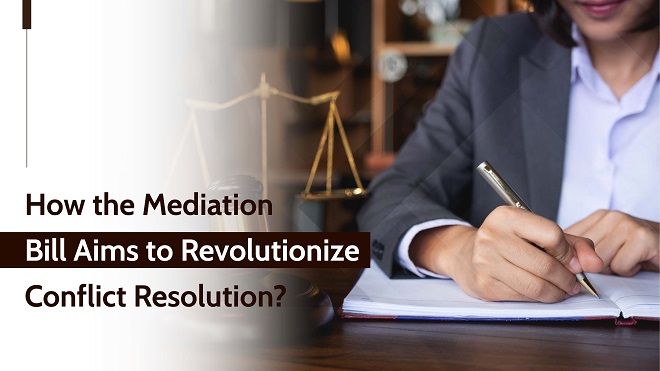How the Mediation Bill Aims to Revolutionize Conflict Resolution?

Mediation is a process of resolving disputes between parties with the help of a neutral third party, called a mediator, who facilitates dialogue and communication and assists the parties in reaching a mutually acceptable solution. It is widely recognised as an effective and efficient alternative to litigation, arbitration, or other adversarial methods of dispute resolution.
However, in India, mediation has not been widely adopted as a preferred mode of dispute resolution despite the existence of various statutory provisions and judicial pronouncements that encourage and promote it. The Mediation Bill 2021 was introduced to address this gap and provide a much-needed boost to the mediation sector in India. In this blog, we discuss more about this bill as we figure out how it may revolutionise the system of crime and punishment in India.
Table of Contents
|
The Need for Mediation Bill 2021
Even though mediation saves time and money and preserves relationships, the lack of a comprehensive and uniform legal framework that regulates and governs this ADR (Alternative Dispute Resolution) method in India hinders its widespread adoption.
Thus, the Mediation Bill 2021 seeks to establish a statutory framework for mediation in India by:
- Defining the key terms and concepts related to mediation
- Laying down the principles and standards for conducting mediation
- Providing for the accreditation and regulation of mediators
- Creating mechanisms for enforcement of mediated settlements, and
- Ensuring confidentiality and immunity of mediation proceedings.
How The Mediation Bill Aims to Revolutionise ADR
To understand how the Mediation Bill 2021 has the potential to ease the tiresome legal process that plagues the Judiciary, we need to take a deeper look at the bill itself. The main features and objectives of the Mediation Bill are as follows:
Defining Mediation to Make it Clear-cut Legally
The Bill defines mediation as “a voluntary process in which parties attempt to resolve their dispute with the assistance of a mediator”. It also defines a mediator as “an impartial third party who assists the parties in reaching a mutually acceptable settlement”. The Mediation Bill 2021 clarifies that mediation can be initiated by the parties themselves or by a court or an arbitral tribunal. It can be conducted before or during any judicial or arbitral proceedings.
Conceptualising a Framework for Mediation
The Bill lays down the principles and standards for conducting mediation, such as voluntariness, party autonomy, confidentiality, impartiality, neutrality, competence, fairness, transparency, and good faith. It also prescribes the duties and responsibilities of mediators, such as:
- Disclosing any conflict of interest or bias
- Maintaining confidentiality and impartiality
- Facilitating communication and understanding between parties
- Assisting parties in identifying their interests and options
- Refraining from giving legal advice or imposing solutions (even if they might be the best advocate in Chandigarh), and
- Terminating the mediation if it becomes futile or counterproductive.
Establishing A Regulatory Body: The MCI
The Bill provides for the accreditation and regulation of mediators by establishing a Mediation Council of India (MCI), a statutory body consisting of representatives from various stakeholders such as the judiciary, the government, the legal profession, the mediation sector, and civil society. The MCI will be responsible for:
- Setting the qualifications, criteria, and standards for accreditation of mediators
- Maintaining a register of accredited mediators
- Conducting training and awareness programs on mediation
- Promoting research and development on mediation, and
- Monitoring and supervising the quality and effectiveness of mediation services.
Setting Legal Mechanisms For Enforcement
The Bill creates mechanisms for the enforcement of mediated settlements by providing that a mediated settlement agreement shall have the same status and effect as an arbitral award under the Arbitration and Conciliation Act of 1996. This means that a mediated settlement agreement can be enforced by a court as if it were a decree of the court. The Mediation Bill 2021 also provides that a court or an arbitral tribunal can refer a dispute to mediation at any stage of the proceedings if it considers it appropriate or if the parties agree to do so.
It further states that if a dispute is referred to mediation by a court or an arbitral tribunal, the period spent in mediation shall be excluded from the computation of the limitation period for filing or initiating any suit or proceeding.
Ensuring the Privacy of Citizens
The Bill ensures confidentiality and immunity of mediation proceedings by stating that all communications made during mediation shall be confidential and privileged from disclosure in any judicial or arbitral proceedings or any other forum. It also protects the mediators themselves by stating that no mediator shall be compelled to disclose any information obtained during mediation or to testify as a witness in any judicial or arbitral proceedings or any other forum. The Bill further provides that no mediator shall be liable for any act or omission done in good faith while performing his or her functions as a mediator.
Mediation Bill 2021: Hope for the Future of ADR in India
The Mediation Bill 2021 is a welcome step towards creating a conducive environment for mediation in India. It is expected that the Bill will enhance public awareness and confidence in mediation as an effective mode of dispute resolution. Some also hope that the Bill will foster a culture of dialogue and cooperation among parties involved in disputes, such as estranged couples caught in long cases by the India divorce law.
The Bill has been referred to a parliamentary standing committee for further examination and consultation. It remains to be seen how soon the Bill will become law and how well it will be implemented in practice.
Conclusion
Mediation is a process of resolving disputes between parties with the help of a neutral third party who facilitates dialogue and communication. It is an alternative to litigation or arbitration that saves time and money and preserves relationships. However, mediation has not been widely adopted in India due to the lack of a legal framework that regulates and governs it.
The Mediation Bill 2021 aims to provide a statutory framework for mediation in India by defining the key terms and concepts, laying down the principles and standards, providing for the accreditation and regulation of mediators, creating mechanisms for enforcement of mediated settlements, and ensuring confidentiality and immunity of mediation proceedings. For more information about this positive step towards promoting mediation in India or even if it might be applicable to your legal issues, do consult us at Lex Solutions today!
FAQs
- When was the mediation bill first passed?
The upper house of Rajya Sabha first passed the Mediation Bill 2021 on August 1, 2023.
2. Is the mediation bill already in effect?
No, with the Lok Sabha finally passing the Bill on August 7, 2023, it only requires Presidential approval before it comes into effect.
3. Can I get mediation for free?
Yes, the judicial system provides mediators and support staff for free in India. However, many lawyers at private firms like Lex Solutions specifically train to become skilled mediators and can be hired for the same.
4. Can mediation be useful for criminal cases?
No, mediation cannot be applied to criminal cases as per all existing laws and the upcoming Meditation Bill.




